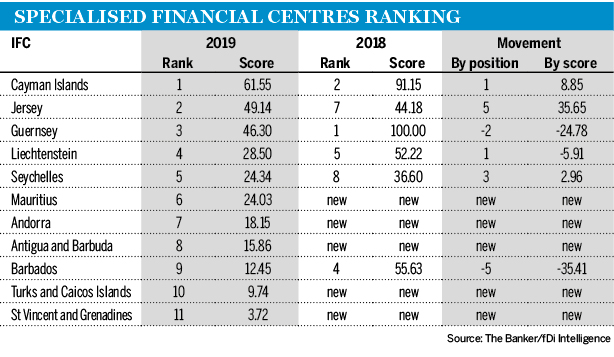IFCs defy global uncertainty – for now
The Banker’s annual ranking of international finance centres remains mostly unchanged, despite financial upheaval on the horizon. Silvia Pavoni reports.
Aunusual combination of events is causing concern over the future of some of the world’s leading financial centres. Brexit, of course, has long been a source of doubt regarding London’s long-term prospects as a magnet for capital, financial services and brainpower. And in Asia, Beijing’s response to ongoing protests in Hong Kong may jeopardise the special administrative region’s international standing.
On the other hand, if successful, ambitious deals such as the Hong Kong Stock Exchange’s bid to buy the London Stock Exchange, subsequently rejected by the British bourse, would put the Asian hub on a more hopeful course.
In Latin America, Buenos Aires is facing the possibility of defaulting on its international debt and has reintroduced foreign exchange controls, alarming investors. The Argentinian capital is last on The Banker’s 2019 ranking of international financial centres, which analyses 57 hubs across the world that have global or regional importance and offer comparable data.
More of the same
Despite localised concerns, positions in the tables have not changed a great deal since the previous ranking. London once again occupies the top spot, followed by New York and Singapore. The UK centre remains the largest by number of both outward and inward foreign direct investment (FDI) projects in financial services. More broadly, it leads by the size and potential of its financial sector, as illustrated by the financial services cluster table, which in addition to FDI flows considers bank assets, total number of financial services companies present and other factors.
The most improved hubs are Prague, the leading centre in central and eastern Europe, and Shenzhen, which climb nine and eight places to 27th and 21st, respectively. Beijing also did well, climbing seven places to 12th. The centres that did the worst in relative terms are Stockholm and Madrid, which moved down six places to 29th and 31st, respectively.
In the specialised financial centres ranking, the Cayman Islands leads followed by Jersey and Guernsey. Jersey climbs by five places, while Barbados has fallen the furthest, also by five places. Only specialised centres that respond to The Banker’s dedicated survey, which requests data that is not always publicly available, are listed in the ranking.
Methodology
The Banker’s ranking of international financial centres (IFCs) is based on data ranging from financial markets indicators to economic potential to business environment factors. A total of 82 indicators have been used in our analysis. The ranking focuses on the level of international business and the value offered to institutions seeking to expand their international operations. In recognition of the fact that data for specialised financial centres is seldom consistent with that for mainland financial centres, The Banker has surveyed each specialised IFC and compiled a separate table using information relevant to these locations. Publicly available data sources were used, as well as The Banker Database and fDi Markets.



